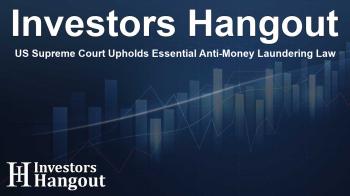US Supreme Court Upholds Essential Anti-Money Laundering Law

US Supreme Court Supports Anti-Money Laundering Initiatives
The U.S. Supreme Court has recently confirmed the enforcement of a significant anti-money laundering federal law that mandates corporate entities to reveal the identities of their actual beneficial owners to the U.S. Treasury Department. This ruling is a response to a legal challenge that had temporarily halted the implementation of the Corporate Transparency Act.
Implications of the Corporate Transparency Act
This law, passed in 2021, faced scrutiny and pushback from various small businesses. Critics argued that the act represented an overreach of congressional powers under the Constitution. However, the Supreme Court’s decision has lifted a nationwide injunction that was previously put in place by a federal judge in Texas, who believed that the law exceeded Congress's authority.
Understanding Beneficial Ownership
Definition is crucial in this matter, as a beneficial owner is commonly defined as an individual who directly or indirectly owns or controls a company. Under the new law, corporations and limited liability companies (LLCs) are required to provide detailed information regarding their beneficial owners to the Financial Crimes Enforcement Network (FinCEN).
The Government's Position
Former President Biden's administration argued that it was essential for the law to be enforced swiftly, as many businesses had already complied with the reporting requirements prior to the legal challenges. The administration emphasized the importance of these measures in combating crime, notably money laundering, tax fraud, and terrorism financing. Solicitor General Elizabeth Prelogar pointed out the necessity of such regulations in the government’s efforts to detect and prosecute financial crimes.
Challenges Faced by the Law
The injunction that blocked the enforcement of this law originated from the National Federation of Independent Business, which sought a ruling against the law through their representation by the Center for Individual Rights. The Supreme Court's decision comes as a crucial victory for advocates of the Corporate Transparency Act, ensuring that the vital reporting requirements aimed at minimizing criminal activities remain in effect.
Future Outlook
Supporters of the act argue that it is a necessary step in addressing the alarming trend of criminals utilizing entities like LLCs, which can be established under state laws without the obligation to disclose their involvement. The law aims to close these loopholes and strengthen financial regulations in the U.S.
Frequently Asked Questions
What is the purpose of the Corporate Transparency Act?
The Corporate Transparency Act requires corporations and LLCs to disclose their beneficial owners to help combat money laundering and promote transparency.
Who qualifies as a beneficial owner?
A beneficial owner is an individual who directly or indirectly owns or controls a company, and their information must be reported under the new law.
Why did the Supreme Court get involved?
The Supreme Court intervened to lift a nationwide injunction that had previously prevented the enforcement of the act, ensuring its implementation across the U.S.
What are the potential consequences of this act?
By enforcing this act, the government aims to reduce financial crimes, including money laundering and terrorism financing, by increasing transparency in corporate ownership.
How does this impact small businesses?
While small businesses challenged the act, the requirement for transparency is viewed as a crucial measure for leveling the playing field and ensuring compliance across all business types.
About The Author
Contact Evelyn Baker privately here. Or send an email with ATTN: Evelyn Baker as the subject to contact@investorshangout.com.
About Investors Hangout
Investors Hangout is a leading online stock forum for financial discussion and learning, offering a wide range of free tools and resources. It draws in traders of all levels, who exchange market knowledge, investigate trading tactics, and keep an eye on industry developments in real time. Featuring financial articles, stock message boards, quotes, charts, company profiles, and live news updates. Through cooperative learning and a wealth of informational resources, it helps users from novices creating their first portfolios to experts honing their techniques. Join Investors Hangout today: https://investorshangout.com/
The content of this article is based on factual, publicly available information and does not represent legal, financial, or investment advice. Investors Hangout does not offer financial advice, and the author is not a licensed financial advisor. Consult a qualified advisor before making any financial or investment decisions based on this article. This article should not be considered advice to purchase, sell, or hold any securities or other investments. If any of the material provided here is inaccurate, please contact us for corrections.

